 In a few weeks the 59th BFI London Film Festival will open, screening 238 films from 72 countries in 16 cinemas over 12 days. The main accolade awarded each year is the ‘Best Film’ prize, which last year was won by Andrey Zvyagintsev’s Leviathan. This year’s 13 nominees have just been announced and the winner will be revealed on the last day of the festival, 17th October.
In a few weeks the 59th BFI London Film Festival will open, screening 238 films from 72 countries in 16 cinemas over 12 days. The main accolade awarded each year is the ‘Best Film’ prize, which last year was won by Andrey Zvyagintsev’s Leviathan. This year’s 13 nominees have just been announced and the winner will be revealed on the last day of the festival, 17th October.
The London Film Festival is the highest profile UK film festival and takes place in many of the UK’s most prestigious cinematic venues. It’s often regarded as being in the second tier of major international festivals, behind only The Big Five (Cannes, Berlin, Venice, Sundance and Toronto). Each festival has their own tastes and therefore screen certain types of films. Earlier this year I took a look at the films In Competition at the Cannes Film Festival so I thought I would take a look at the films at the London Film Festival. In summary…
- 92% of films In Competition at the London Film Festival are dramas
- Films with public funding at the London Film Festival have lower audience ratings that those without
- Films shortlisted in Cannes are more male-centric whereas films at the London Film Festival are more female-centric
The London Film Festival REALLY likes dramas
Of the 59 films shortlisted for ‘Best Film’ over the past five years, only 5 (i.e. 8%) were not dramas. Films often have multiple genres, meaning that the next most popular genres are comedies, thrillers and romances.
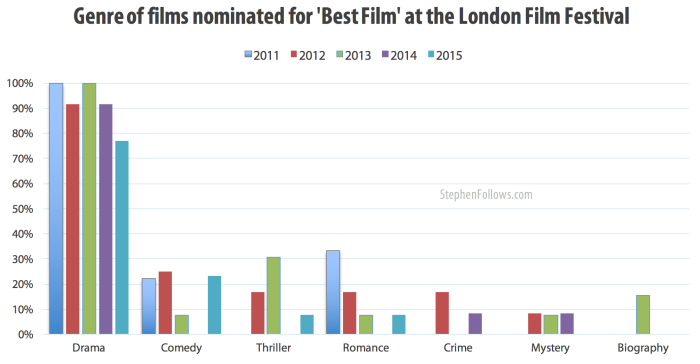
Does the BFI support their own films?
 One often repeated comment about the BFI London Film Festival is that BFI-supported films seem to get favourable treatment. Obviously this is not something we can measure conclusively but we can look for clues. I compared the IMDb user ratings for the nominated films, splitting the films into two groups – films with public funding (from the UK Film Council, the BFI or Creative Scotland) and those without public funding.
One often repeated comment about the BFI London Film Festival is that BFI-supported films seem to get favourable treatment. Obviously this is not something we can measure conclusively but we can look for clues. I compared the IMDb user ratings for the nominated films, splitting the films into two groups – films with public funding (from the UK Film Council, the BFI or Creative Scotland) and those without public funding.
The London Film Festival shortlisted films without public funding have a higher average score (7.1 out of 10) than those with public funding (6.7 out of 10).
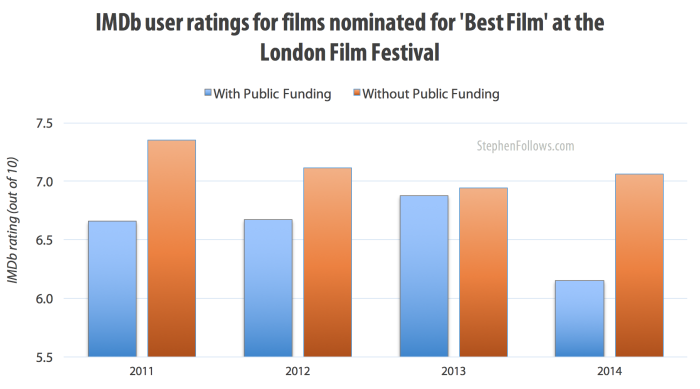
What are the films about?
In my analysis of the Cannes nominated films I discovered that common themes were ‘life’ and ‘love’. For the London Film Festival, popular themes are young women and families. Films shortlisted in Cannes are more male-centric whereas films at the London Film Festival are more female-centric.
Below is a word cloud which shows the frequency of certain words in the plots of London Film Festival nominated films of the past five years.
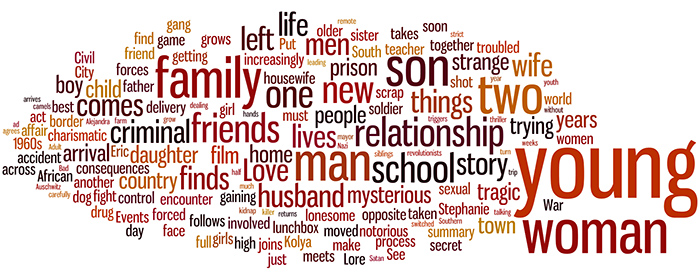
Methodology
I used IMDb, Wikipedia and the London Film Festival website to find details on all the films nominated for ‘Best Film’ award between 2011 and 2015.
Postscript
Interestingly, it seems that the BFI forgot to renew the web domain that used to host the London Film Festival, lff.org.uk. The BFI initially bought the domain on 16th September 1996 but let the renewal lapse, allowing Morgan O’Connor to buy it on 17th December 2012. This isn’t the only such domain which used to be owned by the BFI which is now in other hands as ukfilmcouncil.org.uk now points to the website of the University of the Creative Arts. To be fair to the BFI, they do manage around 70 domains, each needing annual renewal.

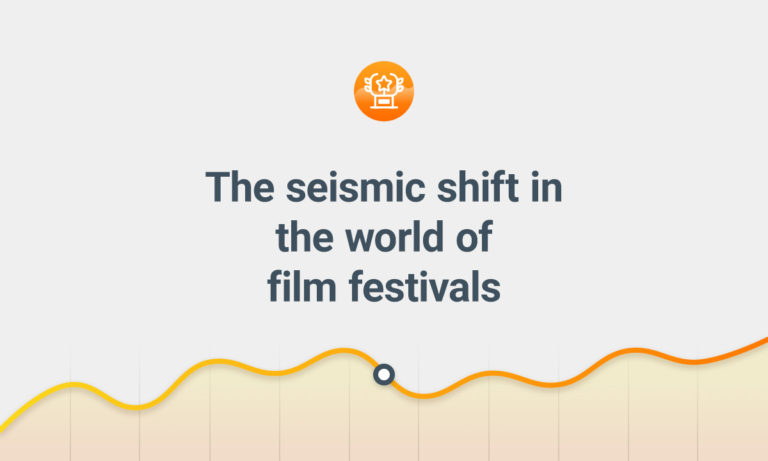

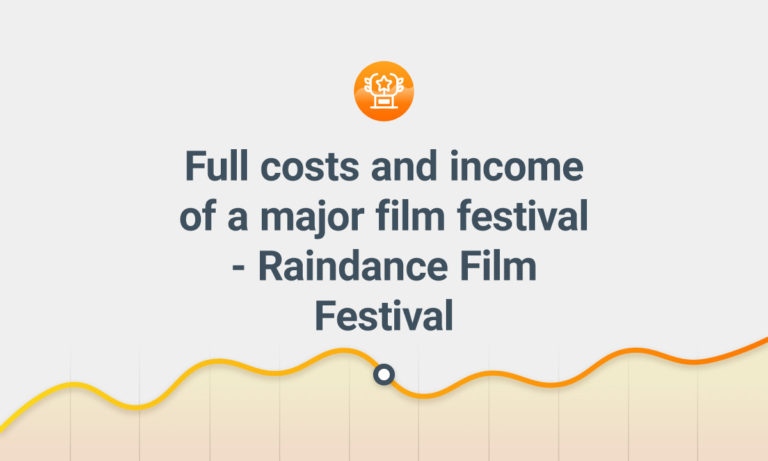

Comments
The Awards resulted are announced at the LFF Awards on the 17th not the 18th, which is Closing Night
Ah, thanks for that. I’ve corrected it now.
Another great article Stephen, always love your stats. I would LOVE to see stats of horror films over the past 5 years including gender in horror, US/UK vs ROW, profitable vs other genres, box-office vs DVD/VOD etc. Do you have something you have already done on the horror genre? Would love to read it. Thank you and keep up the great work.